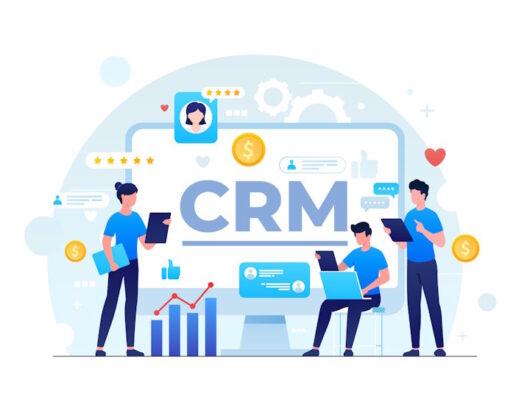In today’s highly competitive business environment, integrating your CRM (Customer Relationship Management) system with your marketing strategy is essential. Not only for driving growth, but also enhancing customer engagement, and improving conversion rates. A CRM is not just a tool for storing customer data. It is an indispensable asset that can streamline marketing efforts by providing valuable insights, automating tasks, and enabling personalized communication.
By effectively combining CRM and marketing efforts, businesses can gain a holistic view of their customers, segment their audience for more targeted campaigns, and create seamless communication that drives better results. Here are some best practices for integrating CRM with your marketing strategy and how Utilmo can help you with them.
1. Centralize Customer Data
One of the first steps in integrating your CRM with your marketing strategy is ensuring that all customer data is stored in one centralized location. A CRM collects and organizes information from different touchpoints such as emails, social media interactions, and website visits. When this data is accessible and organized, it becomes easier to segment your audience based on behaviors, preferences, and demographics.
This rich customer data allows your marketing team to create more personalized campaigns that resonate with each segment. For example, you can target high-value customers with special offers or send tailored content to new leads who have shown interest in specific products or services. Utilmo is the perfect CRM for this as it stores all this data.
2. Automate Marketing Campaigns
Automation is one of the most powerful ways that CRM systems enhance marketing efforts. By integrating your CRM with your marketing tools, you can automate key parts of your campaigns. This saves time and ensures consistency. Many CRM systems allow you to set up automated email sequences, social media posts, and SMS campaigns that are triggered based on specific customer actions or behaviors. Utilmo is the perfect choice for this type of use. Not only does it have already premade email and text campaigns but you’re able to make your own. You are able to choose the contents of each message and time between them.
3. Segment Your Audience for Targeted Campaigns
Effective marketing is all about delivering the right message to the right people at the right time. A CRM system makes audience segmentation effortless by categorizing your leads and customers based on various criteria such as demographics, location, purchase behavior, and engagement history. With these segmented groups, you can create highly targeted campaigns that speak directly to the needs and preferences of your audience.
For example, a business might create one campaign specifically for new customers who have just signed up for their newsletter, while running a separate campaign for repeat customers offering loyalty rewards. These personalized messages are far more likely to drive engagement than a generic, one-size-fits-all approach.
4. Measure and Analyze Campaign Effectiveness
Integrating your CRM with your marketing strategy also makes it easier to track and measure the effectiveness of your campaigns. Most CRM platforms come with analytics tools that help you monitor key performance indicators (KPIs). These include open rates, click-through rates, conversion rates, and return on investment (ROI). By analyzing this data, you can gain valuable insights into what’s working and what’s not.
For instance, if an email campaign is underperforming, you can quickly adjust the subject line, content, or offer and see how these changes affect the campaign’s results. This ability to continuously optimize campaigns based on real-time data is crucial for maximizing the impact of your marketing efforts.
5. Enhance Customer Experience Through Personalization
Personalization is key to building strong, long-lasting relationships with customers. By integrating your CRM with your marketing tools, you can use the data to tailor the customer experience at every stage of the buyer’s journey. From personalized email messages to dynamic website content, CRM data can help you speak directly to the needs of individual customers.
6. Optimize Lead Nurturing
CRM systems are excellent for managing and nurturing leads through the sales funnel. By integrating CRM data with your marketing strategy, you can track leads’ interactions with your brand and automate the lead nurturing process. This includes sending relevant content, follow-up emails, and reminders that encourage leads to move toward making a purchase.
7. Ensure Consistency Across Channels
Today’s customers interact with brands across multiple channels, from email to social media, live chat, and even in-person interactions. To provide a consistent and seamless experience, it’s essential to integrate your CRM with all your marketing and communication channels. This ensures that no matter where a customer interacts with your brand, they receive consistent messaging and service.
If a customer interacts with your brand via social media, their information should be updated in your CRM. This ensures that your sales or support teams can pick up the conversation without missing a beat. This unified approach ensures that customers receive a personalized experience regardless of the platform they choose to engage on. Thankfully Utilmo gets you leads wherever a potential client inputs their information.
Conclusion
Integrating CRM with your marketing strategy is no longer optional. It’s a necessity for businesses that want to stay competitive in today’s fast-paced market. By following these steps, businesses can create highly effective marketing strategies that resonate with their target audiences and drive results.
Leveraging CRM technology to its full potential allows businesses to work smarter, not harder. Therefore, ultimately fosters stronger, more loyal customer relationships. Whether you’re a small business or a large enterprise, integrating CRM is a surefire way to elevate your marketing efforts and grow your business. Contact Utilmo today to get you started on your CRM journey.







